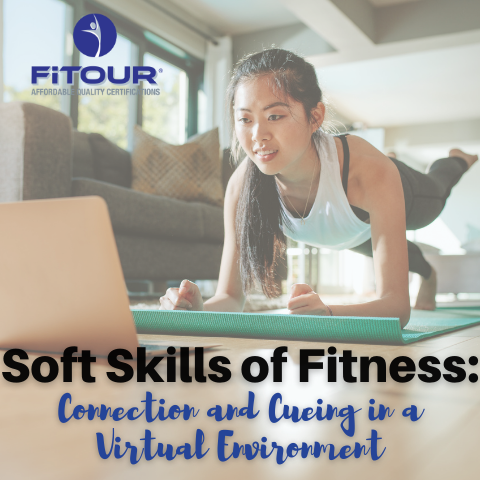Enviado por Melissa Vidito el

Soft skills are typically innate personal attributes that an instructor naturally brings to the job. These skills aren’t part of formal education; but soft skills can be learned and improved through time and experience within the field. It is important to acknowledge the difference between the hard and soft skills of fitness to better understand and work toward improving how we show up for our classes and clients.
Hard skills include the information that you’ve learned through professional education course work. In the FiTOUR® In-Home Certifications, we teach hard skills:
-
Anatomy
-
Physiology
-
Understanding movement and exercise with the planes of motion
-
Assessments
-
Program design
-
Business skills of personal training
FiTOUR doesn’t have certification on the innate soft skills, learned or acquired, that differentiate instructors and make them uniquely qualified to teach a class or instruct clients. Soft skills are distinct to each person:
-
Communication
-
Passion
-
Empathy
-
Friendliness
-
Patience
-
Leadership
-
Organization
-
Time management
-
Teamwork
-
Decision making
-
Stress management
-
Critical thinking
-
Resourcefulness
These soft skills are what make certified personal trainers and instructors UNIQUE. These skills bring your personality to life in fitness and showcase how much you love your work.
In the online environment, these soft skills should be amplified. For your online business to be successful, you need to operate like it is an in-person business. Time-management and organization should be top priorities. Through the virtual experience, communication is also essential. Be clear and concise in your communication and practice active listening skills to improve online communication. Instructors should take their motivation to the next level in the virtual training environment to inspire each member of a class. Remember, in a virtual environment the client or participant is home alone in a room or might have some distractions in the background - keeping motivation high will improve their focus and long-term success in the virtual environment.
One aspect of fitness that needs extra attention in an online class is building personal connections. Group exercise brings people together and builds community. This should still remain a goal in an online class. Make sure your classes feel welcome and comfortable. Get to know each of their names and use those names as often as possible! When you have a new member join the class, introduce yourself and welcome them to the whole group. Tell them how happy you are to see them each time you are together! Run competitions to improve accountability and congratulate the class when they make it through the workouts. Virtual high-fives still feel good - use them! All of the things you would do in-person, aside from hugs or touching each other, are possible in a virtual class; often, though it feels less natural. Use a post-it note to remind and inspire yourself to be bolder in your online classes. Private Facebook groups allow your classes to connect outside of the Zoom or fitness platform and share authentically about their journeys; create a group to bring people together before or after class, keep them informed of upcoming events, and workout essentials!
One communication soft skill that isn’t detailed explicitly in a textbook is the art of cueing movement. As a certified personal trainer or group fitness instructor you have learned the best movements to design effective programs. Cues online need to be especially clear and concise, get right to the point, to describe each movement selected and what muscle group is working. Explain the movement clearly and define the muscle that should feel the work. Keep in mind internet delays might create a chaotic look to a choreographed class; consider sticking with a slower BPM and full 32 count movement patterns. Make movements as simple as possible and perform movements with longer reps or counts to allow everyone to get on the beat if necessary.
Most important in virtual training? Have fun and be yourself. Don’t get caught up in the minutia of cueing or get upset with yourself if you didn’t feel the class connected as they did last year or last week! Remember they are there to be with you, to move, feel good, and energized by your positivity. If something felt a little bit off just keep moving, smiling, and having fun. Your classes will be inspired by how much you love what you do and they will keep coming back for more!
